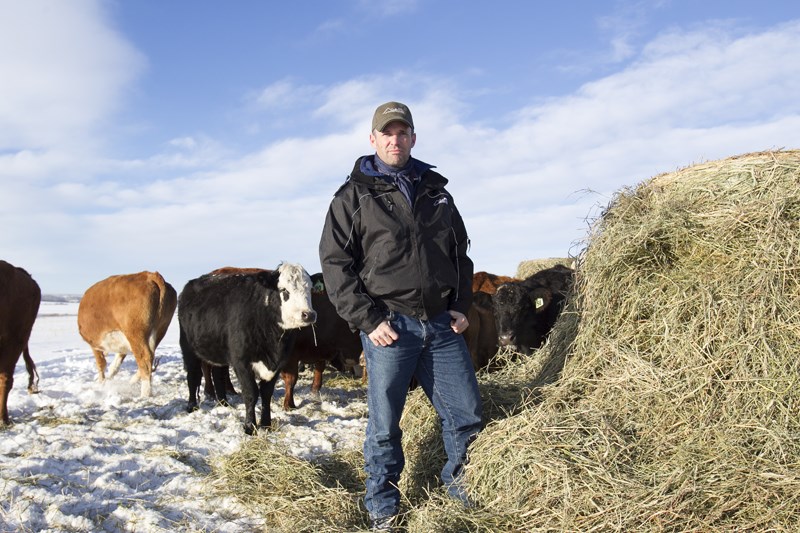The Foothills Forage and Grazing Association (FFGA) has been working with ranchers for 41 years and officials are excited for another productive year of events and education.
The non-profit group works with producers to bring them new information and methods, explains Laura Gibney, manager of FFGA.
"Our main focus is extension work,î Gibney told the Gazette. "So extension is those field days where we either go out to someone's place and look at something they're doing or trying, or we'll bring in speakers and hold workshops and seminars, that's our main focus.
"We put out a monthly newsletter, have the website, all that kind of stuff, and we do have some of these demo sites.
"We work with producer co-operators who then - through the association - gather data on that, put together some reports, and then have tours out there. It's taking research and actually applying it at the on-farm level and seeing how it works in a real-life situation.î
Sean LaBrie, treasurer of FFGA, has been utilizing a winter grazing bale site for his livestock on his property west of Didsbury.
LaBrie explained that the winter site is being utilized to rejuvenate some less-productive grass and hay fields.
"So what that does is it covers up the bare dirt with the leftover hay and straw, and it refertilizes using (cow waste) as well as it capturing a bunch of the snow, which allows some release throughout the spring because it melts at a different rate (than usual),î said LaBrie.
This helps to give the natural fertilizer a slow release rate, which helps to revive the depleted soil evenly, he said.
LaBrie joined the FFGA because he was born and raised in the city and ended up meeting a rancher - Holly, his wife - and moving to the country.
"I needed to get some info on how to run a ranch and use best new ranching practices,î he said. "So through a family member of Holly's, who lived in the area, he suggested me going out to a (FFGA class).î
At that point, he decided to become a member, sat on the board as a director for a year and then spent the next five years as the secretary-treasurer of FFGA, he said.
Gibney mentioned another demonstration that took place near Mosley, (outside Edmonton) where one farmer used tillage radish as not only a feed source, but also as a soil amendment to break up the hard pan, which is densely-packed dirt.
"We're basically encouraging (economically) sustainable ranching,î said Gibney. "So we're trying to find things that work for guys that are going to make sense on the financial side - like reducing costs. Usually the big one is winter feeding costs, but it could be anything.î
FFGA also shares information on improving health in livestock, she noted.
"Because that also saves money. It could be value added concepts - we go out there and do local food stuff, we do cattle handling workshops, lots of different grazing techniques and management systems,î she said.
The association also focuses on environmental sustainability, such as weed control methods, how to handle riparian lands, and grazing management to prevent erosion.
"It's basically just sharing ideas and new ways for them to do things,î she said.
The FFGA is gearing up for another year of demonstrations with a ëRanching Opportunities' event, which was scheduled to be held last Friday, Feb. 8., and a demonstration of winter grazing, watering systems, grazing for brush control, and spring development at the A7 Ranch near Nanton on Feb. 20, she added.
"Our annual general meeting is going to be in High River (March 14),î she said. "We have to have our actual meeting portion, and then we're going to be bringing in guest speaker Brenda Schoepp, who is a Nuffield Scholar.î
Schoepp will discuss ëTen things you need to know about your agricultural world'.
"We did a farm ladies' roundtable winter retreat in January, and that was up at the Olds College in conjunction with several of the counties in the region, and they're also part of the group that puts on Ranching Opportunities,î said Gibney.
The FFGA is also in the process of planning a local food workshop in coordination with Mountain View County, featuring Joel Salatin, in the fall.
Salazin, she explained, is a multi-species, high-density grazer.
"He grazes cattle, hogs, chickens, turkeys, sheep, and is out of Virginia,î said Gibney.
"He is also a high-density grazer and he sells all of his food locally. He's a local food expert, as far as marketing and networking goes, and all the details of that.î
For those interested in learning more about the organization and its events for the coming year, its website can be found at (www.foothillsforage.com).



